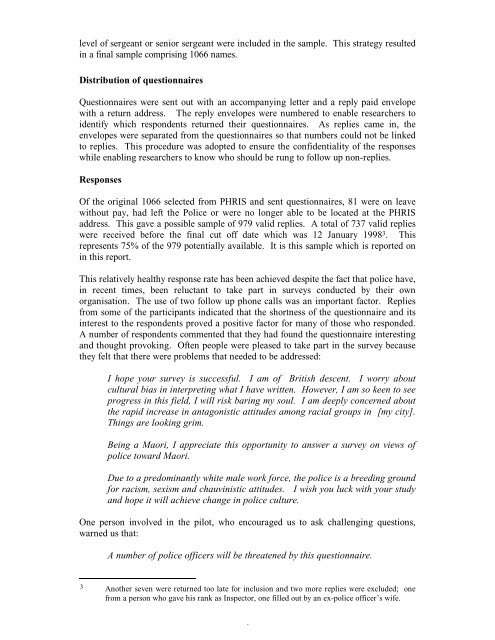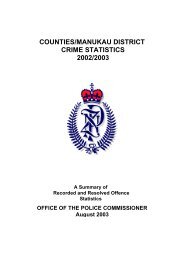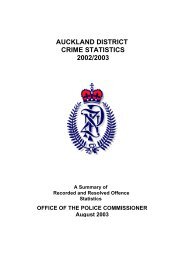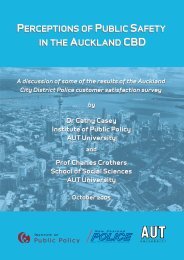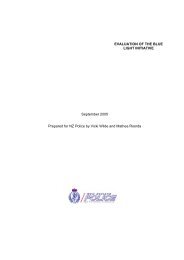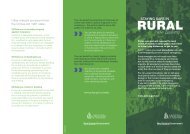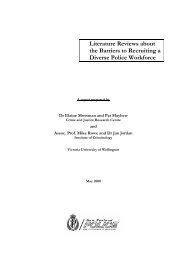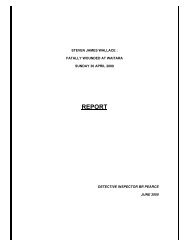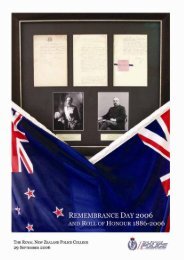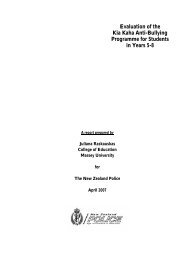Police Perceptions of Maori - Rethinking Crime and Punishment
Police Perceptions of Maori - Rethinking Crime and Punishment
Police Perceptions of Maori - Rethinking Crime and Punishment
You also want an ePaper? Increase the reach of your titles
YUMPU automatically turns print PDFs into web optimized ePapers that Google loves.
level <strong>of</strong> sergeant or senior sergeant were included in the sample. This strategy resulted<br />
in a final sample comprising 1066 names.<br />
Distribution <strong>of</strong> questionnaires<br />
Questionnaires were sent out with an accompanying letter <strong>and</strong> a reply paid envelope<br />
with a return address. The reply envelopes were numbered to enable researchers to<br />
identify which respondents returned their questionnaires. As replies came in, the<br />
envelopes were separated from the questionnaires so that numbers could not be linked<br />
to replies. This procedure was adopted to ensure the confidentiality <strong>of</strong> the responses<br />
while enabling researchers to know who should be rung to follow up non-replies.<br />
Responses<br />
Of the original 1066 selected from PHRIS <strong>and</strong> sent questionnaires, 81 were on leave<br />
without pay, had left the <strong>Police</strong> or were no longer able to be located at the PHRIS<br />
address. This gave a possible sample <strong>of</strong> 979 valid replies. A total <strong>of</strong> 737 valid replies<br />
were received before the final cut <strong>of</strong>f date which was 12 January 1998 3 . This<br />
represents 75% <strong>of</strong> the 979 potentially available. It is this sample which is reported on<br />
in this report.<br />
This relatively healthy response rate has been achieved despite the fact that police have,<br />
in recent times, been reluctant to take part in surveys conducted by their own<br />
organisation. The use <strong>of</strong> two follow up phone calls was an important factor. Replies<br />
from some <strong>of</strong> the participants indicated that the shortness <strong>of</strong> the questionnaire <strong>and</strong> its<br />
interest to the respondents proved a positive factor for many <strong>of</strong> those who responded.<br />
A number <strong>of</strong> respondents commented that they had found the questionnaire interesting<br />
<strong>and</strong> thought provoking. Often people were pleased to take part in the survey because<br />
they felt that there were problems that needed to be addressed:<br />
I hope your survey is successful. I am <strong>of</strong> British descent. I worry about<br />
cultural bias in interpreting what I have written. However, I am so keen to see<br />
progress in this field, I will risk baring my soul. I am deeply concerned about<br />
the rapid increase in antagonistic attitudes among racial groups in [my city].<br />
Things are looking grim.<br />
Being a <strong>Maori</strong>, I appreciate this opportunity to answer a survey on views <strong>of</strong><br />
police toward <strong>Maori</strong>.<br />
Due to a predominantly white male work force, the police is a breeding ground<br />
for racism, sexism <strong>and</strong> chauvinistic attitudes. I wish you luck with your study<br />
<strong>and</strong> hope it will achieve change in police culture.<br />
One person involved in the pilot, who encouraged us to ask challenging questions,<br />
warned us that:<br />
A number <strong>of</strong> police <strong>of</strong>ficers will be threatened by this questionnaire.<br />
3 Another seven were returned too late for inclusion <strong>and</strong> two more replies were excluded; one<br />
from a person who gave his rank as Inspector, one filled out by an ex-police <strong>of</strong>ficer’s wife.<br />
6


